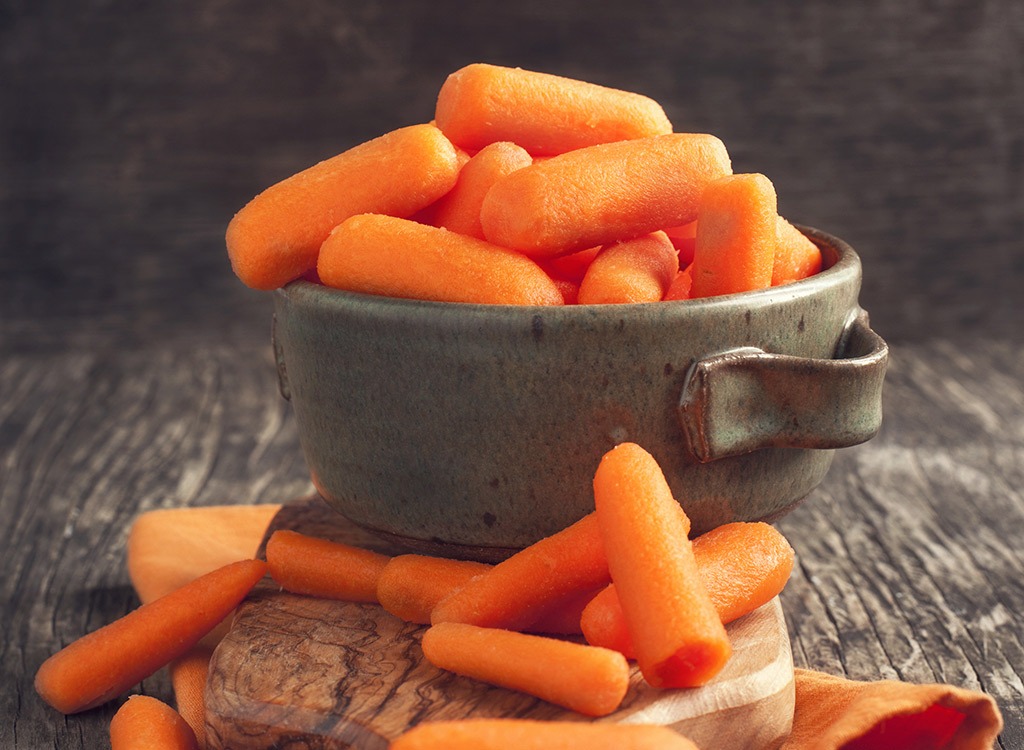This is Why Some People Hiccup When They Eat Carrots

And it’s not just our Eat This, Not That! co-workers. According to questions people have posted on Quora, AskReddit, Yahoo Answers, and even a site called “Is It Normal?” this is a fairly common problem among baby carrot eaters. (If you were curious, 60 percent of IsItNormal.com users reported it was normal to get hiccups whenever you eat carrots.) So what’s going on here? Is it normal to hiccup when you’re eating carrots? Should you be worried? Let’s take a closer look.
Hiccups are involuntary muscle spasms of the diaphragm, which is a muscle that sits between your lungs and stomach. According to Medical News Today, the most common reason hiccups occur is because we eat too quickly. As a result, our stomach becomes bloated from all the food, which can irritate your diaphragm to the point where it contracts suddenly.
So where do carrots come into play? According to studies by researchers at the University of Maryland Medical Center, certain foods can cause hiccups more than others. Besides carrots, evidence supports that spicy foods, hot foods, carbonated beverages (like beer or soda), and other raw veggies like cauliflower, can also cause hiccups.
There’s no scientific proof, but some theories behind why certain individuals hiccup after eating raw carrots is because they’re extra crunchy, which means more air goes into your diaphragm each time you eat one.
Do you have anything to be worried about?
Not at all. Short-lived hiccups are harmless, and, according to Daniel Neides, MD, you should only start worrying if your hiccups last longer than a day, which “may indicate the presence of a medical issue that needs attention.”
Is there any way to prevent this from happening?
For starters, you can try chewing the carrot thoroughly before swallowing to decrease the amount of air you’ll ingest with a bigger piece. Some people suggest dipping the carrot in a dressing to help ease the chunky piece of carrot down your throat. (For an Eat This!-approved choice, we recommend hummus or a miso vinaigrette rather than a fat-laden ranch dressing.)
Another option is to cook the carrots to soften them. While, yes, you won’t experience that crispy crunch of a fresh carrot, what you will get is more nutrients! An International Food Research Journal report found that boiling the orange root veggie allows the human body to extract a much larger fraction of its beta-carotene—a carotenoid that the body converts to immune-boosting, vision-protecting, and skin-glowing vitamin A—from the carrots’ cell walls. Consider boiling them and then tossing the cooked carrots in some salt, pepper, thyme, and extra-virgin olive oil, which is rich in healthy fats that help your body absorb the vegetable’s fat-soluble vitamins.
Want to continue munching on carrots like normal?
While there’s little scientific basis to back any classic hiccup remedies up, there’s some anecdotal evidence that an increase in carbon dioxide may help these spasms subsize. That’s why breathing into a paper bag or holding your breath could work, as both of these techniques increase carbon dioxide levels in your lungs, which could help relax your diaphragm.
Either way you decide to tackle your carrot hiccup problem, we urge you not to give them up! Carrots are one of the best low carb snacks because they’re rich in micronutrients and are sure to fill you up with their high fiber and water content without filling you out.








